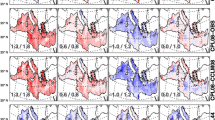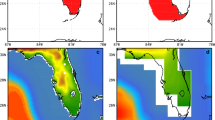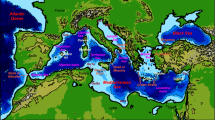Abstract
This study analyzes from a pair of downscaled climate projections over Peninsular Florida (PF) at 10 km grid spacing. One of the downscaled projections corresponds to atmospheric downscaling only with a regional atmospheric model (called the Regional Spectral Model [RSM]). The other projection is related to the coupled ocean–atmosphere Regional Spectral Model-Regional Ocean Model (RSM-ROMS), which downscales both the atmospheric and the oceanic components of the global model simultaneously. The RSM-ROMS shows a better verification of the current climate than the corresponding RSM simulation for some atmospheric variables (precipitation and precipitable water) both over PF and the surrounding oceans. The moisture budget differences between the RSM-ROMS and the RSM simulations for both the current and the future climate show that the differences are larger over the surrounding oceans than over PF. However, RSM-ROMS shows a stronger projected drying over PF than RSM in the mid-twenty-first century. The RSM-ROMS displays a smaller deficit of freshwater over the oceans than RSM because of differences between the simulations in the advection of moisture, divergence of moisture, and moisture flux divergence from transient eddies. The differences in the moisture budget between the simulations over PF are small because of compensatory differences between the divergence of moisture from changes in divergent circulation and the divergence of fluxes from the transient eddies. Our analysis indicates that the air–sea coupling in RSM-ROMS affects the mean gradient of the moisture, the mean divergence, and the transients, which then modulate the advection of moisture, the divergence of moisture, and the convergence of moisture flux, respectively, setting it apart from the RSM simulation.









Similar content being viewed by others
Data availability statement
The validation datasets are available from public repositories cited in the text and in the acknowledgement. The authors were unable to find a valid data repository for the model data used in this study. These data are available from the first author, vmisra@fsu.edu upon request.
References
Alexander MA, Bladé I, Newman M, Lanzante JR, Lau N-C, Scott JD (2002) The atmospheric bridge: the influence of ENSO teleconnections on air-sea interaction over the global oceans. J Clim 15:2205–2231. https://doi.org/10.1175/1520-0442(2002)015%3c2205:TABTIO%3e2.0.CO;2
Alpert JC, Kanamitsu M, Caplan PM, Sela JG, White G, Kalnay E (1988) Mountain induced gravity wave drag parameterization in the NMC medium-range forecast model. In: Proc. 8th Conf. on Numerical Weather Prediction, Baltimore, MD, Amer. Meteor. Soc., pp 726–733
Barsugli JJ, Battisti DS (1998) The basic effects of atmosphere-ocean thermal coupling on midlatitude variability. J Atmos Sci 55:477–493
Bhardwaj A, Misra V (2019) The role of air-sea coupling in the downscaled hydroclimate projection over Peninsular Florida and the West Florida Shelf. Clim Dyn. https://doi.org/10.1007/s00382-019-04669-S
Bosart LF, Hakim GJ, Tyle KR, Bedrick MA, Dickinson MJ, Schultz DM (1996) Large-scale antecedent conditions associated with the 12–14 March 1993 cyclone (“Superstorm’93”) over eastern North America. Mon Wea Rev 124:1865–1891
Castro CL, Pielke RA Sr, Leoncini G (2005) Dynamical downscaling: assessment of value retained and added using the Regional Atmospheric Modeling System (RAMS). J Geophys Res 110:D05108. https://doi.org/10.1029/2004/D004721
Chou M-D, Lee K-T (1996) Parameterizations for the absorption of solar radiation by water vapor and ozone. J Atmos Sci 53:1203–1208
Chou C, Neelin JD (2004) Mechanisms of global warming impacts on regional tropical precipitation. J Clim 17:2688–2701. https://doi.org/10.1175/1520-0442(2004)017%3c2688:MOGWIO%3e2.0.CO;2
Chou C, Neelin JD, Chen C-A, Tu J-Y (2009) Evaluating the “rich-get-richer” mechanism in tropical precipitation change under global warming. J Clim 22(8):1982–2005. https://doi.org/10.1175/2008JCLI2471.1
Chou MD, Suarez MJ (1994) An efficient thermal infrared radiation parameterization for use in general circulation models. In: National Aeronautics and Space Administration, Goddard Space Flight Center. tech. memo, vol 104606, p 85
Christensen JH, Boberg F (2012) Temperature dependent climate projection deficiencies in CMIP5 models. Geophys Res Lett. https://doi.org/10.1029/2012GL053650
Dai Y, Li H, Sun L (2018) The simulation of East Asian summer monsoon precipitation with a regional ocean–atmosphere coupled model. J Geophys Res Atmos. https://doi.org/10.1029/2018JD028541
Denis B, Laprise R, Caya D, Cote J (2002) Downscaling ability of one-way nested regional climate models. The BigBrother Experiment. Clim Dyn 18:627–646
Di Luca A, de Elía R, Laprise R (2012) Potential for added value in precipitation simulated by high-resolution nested Regional Climate Models and observations. Clim Dyn 38(5–6):1229–1247. https://doi.org/10.1007/s00382-011-1068-3
Dickinson MJ et al (1997) The March 1993 superstorm cyclogenesis: incipient phase synoptic and convective scale flow interaction and model performance. Mon Wea Rev 125:3041–3072
Ek MB, Mitchell KE, Lin Y, Rogers E, Grunmann P, Koren V, Gayno G, Tarpley JD (2003) Implementation of Noah land surface model advances in the National Centers for Environmental Prediction operational mesoscale Eta model. J Geophys Res Atmos 108:D22. https://doi.org/10.1029/2002JD003296
Frankignoul C (1985) Sea surface temperature anomalies, planetary waves, and air-sea feedbacks in the middle latitudes. Rev Geophys 23:357–390
Frankignoul C, Hasselmann K (1977) Stochastic climate models. II: application to sea-surface temperature anomalies. Tellus 29:284–305
Gent PR, Danabasoglu G, Donner LJ, Holland MM, Hunke EC, Jayne SR, Lawrence DM, Neale RB, Rasch PJ, Vertenstein M, Worley PH (2011) The community climate system model version 4. J Clim 24(19):4973–4991. https://doi.org/10.1175/2011JCLI4083.1
Gleick PH (1989) Climate change, hydrology, and water resources. Rev Geophys. https://doi.org/10.1029/RG027i003p00329
Grose MR et al (2020) Insights from CMIP6 for Australia’s future climate. Geophys Res Lett 8:5. https://doi.org/10.1029/2019EF001469
Haarsma RJ, Roberts MJ, Vidale PL, Senior CA, Bellucci A, Bao Q, Chang P, Corti S, Fučkar NS, Guemas V, von Hardenberg J, Hazeleger W, Kodama C, Koenigk T, Leung LR, Lu J, Luo J-J, Mao J, Mizielinski MS, Mizuta R, Nobre P, Satoh M, Scoccimarro E, Semmler T, Small J, von Storch J-S (2016) High Resolution Model Intercomparison Project (HighResMIP v1.0) for CMIP6. Geosci Model Dev 9:4185–4208. https://doi.org/10.5194/gmd-9-4185-2016
Haidvogel DB, Arango HG, Hedstrom K, Beckmann A, Malanotte-Rizzoli P, Shchepetkin AF (2000) Model evaluation experiments in the North Atlantic Basin: simulations in nonlinear terrain-following coordinates. Dyn Atmos Oceans 32(3):239–281. https://doi.org/10.1016/S0377-0265(00)00049-X
Harrison M, Meindl CF (2001) A statistical relationship between El Niño-Southern Oscillation and Florida wildfire occurrence. Phys Geogr 22(3):187–203. https://doi.org/10.1080/02723646.2001.10642737
He X, Kim H, Kirstetter PE, Yoshimura K, Chang E-C, Ferguson CR, Erlingis JM, Hong Y, Oki T (2015) The diurnal cycle of precipitation in regional spectral model simulations over West Africa: sensitivities to resolution and cumulus schemes. Wea Forecast 30(2):424–445. https://doi.org/10.1175/WAF-D-14-00013.1
Huffman GJ, Bolvin DT, Nelkin EJ, Tan J (2019) Integrated multi-satellite retrievals for GPM (IMERG) technical documentation. https://gpm.nasa.gov/sites/default/files/document_files/IMERG_doc_190909.pdf
Juang HM, Kanamitsu M (1994) The NMC nested regional spectral model. Mon Wea Rev 122:3–26. https://doi.org/10.1175/1520-0493(1994)122%3c0003:TNNRSM%3e2.0.CO;2
Kanamaru H, Kanamitsu M (2007) Scale-selective bias correction in a downscaling of global analysis using a regional model. Mon Weather Rev 135:334–350. https://doi.org/10.1175/MWR3294.1
Kerr RA (2011) Vital details of global warming are eluding forecasters. Science 334(6053):173–174. https://doi.org/10.1126/science.334.6053.173
Klein SA, Soden BJ, Lau N-C (1999) Remote sea surface temperature variations during ENSO: Evidence for a tropical atmospheric bridge. J Clim 12:917–932
Laprise R (2014) Comment on ‘The added value to global model projections of climate change by dynamical downscaling: A case study over the continental US using the GISS‐ModelE2 and WRF models’ by Racherla et al. J Geophys Res Atmos 119(7):3877–3881. https://doi.org/10.1002/2013JD019945.2012
Lau N-C, Nath MJ (1996) The role of the atmospheric bridge in linking tropical Pacific ENSO events to extratropical SST anomalies. J Clim 9:2036–2057
Li H, Kanamitsu M, Hong SY (2012) California reanalysis downscaling at 10 km using an ocean-atmosphere coupled regional model system. J Geophys Res Atmos 117:D12. https://doi.org/10.1029/2011JD017372
Li H, Kanamitsu M, Hong SY, Yoshimura K, Cayan DR, Misra V (2014a) A high-resolution ocean-atmosphere coupled downscaling of the present climate over California. Clim Dyn 42(3–4):701–714. https://doi.org/10.1007/s00382-013-1670-7
Li H, Kanamitsu M, Hong SY, Yoshimura K, Cayan DR, Misra V, Sun L (2014b) Projected climate change scenario over California by a regional ocean-atmosphere coupled model system. Clim Change 122(4):609–619. https://doi.org/10.1007/s10584-013-1025-8
Liang-Liang Li, Jiang L, Ru-Cong Y (2022) Evaluation of CMIP6 HighResMIP models in simulating precipitation over Central Asia. Adv Clim Chang Res 13:1–13. https://doi.org/10.1016/j.accre.2021.09.009
Loschnigg J, Webster PJ (2000) A coupled ocean-atmosphere system of SST modulation for the Indian Ocean. J Clim 13:3342–3360
Misra V, Mishra A (2016) The oceanic influence on the rainy season of Peninsular Florida. J Geophys Res Atmos 121(13):7691–7709. https://doi.org/10.1002/2016JD024824
Misra V, Dirmeyer PA, Kirtman BP (2001) Regional simulation of interannual variability over South America. J Geophys Res. https://doi.org/10.1029/2001JD900216
Misra V, Mishra A, Li H (2016) The sensitivity of the regional coupled ocean-atmosphere simulations over the Intra-Americas seas to the prescribed bathymetry. Dyn Atmos Oceans 76:29–51. https://doi.org/10.1016/j.dynatmoce.2016.08.007
Misra V, Mishra A, Bhardwaj A (2019) A coupled ocean-atmosphere downscaled climate projection for the peninsular Florida region. J Mar Syst 194:25–40. https://doi.org/10.1016/j.jmarsys.2019.02.010
Moorthi S, Suarez MJ (1992) Relaxed Arakawa-Schubert A parameterization of moist convection for general circulation models. Mon Weather Rev 120(6):978–1002. https://doi.org/10.1175/1520-0493(1992)120<0978:RASAPO>2.0.CO;2
Palmer TN (2014) Build high-resolution global climate models. Nature 515:338–339. https://doi.org/10.1038/515338a
Pielke RA Sr, Wilby RL (2012) Regional climate downscaling: what’s the point? Eos 93:52–53
Putrasahan DA, Kamenkovich I, Henaff LM, Kirtman BP (2017) Importance of ocean mesoscale variability for air-sea interactions in the Gulf of Mexico. Geophys Res Lett.https://doi.org/10.1002/2017GL072884
Racherla PN, Shindell DT, Faluvegi GS (2012) The added value to global model projections of climate change by dynamical downscaling: a case study over the continental US using the GISS-ModelE2 and WRF models. J Geophys Res Atmos 117:1984–2012. https://doi.org/10.1029/2012JD018091
Roads J (2004) Experimental weekly to seasonal U. S. forecasts with the regional spectral model. Bull Am Soc 85:1888–1902. https://doi.org/10.1175/BAMS-85-12-1887
Seager R, Naik N, Vecchi GA (2010) Thermodynamic and dynamic mechanisms for large-scale changes in the hydrological cycle in response to global warming. J Clim 23:4651–4668. https://doi.org/10.1175/2010JCLI3655.1
Shchepetkin AF, McWilliams JC (2005) The regional oceanic modeling system (ROMS): a split-explicit, free-surface, topography-following-coordinate oceanic model. Ocean Model 9(4):347–404. https://doi.org/10.1016/j.ocemod.2004.08.002
Siqueira L, Kirtman BP (2016) Atlantic near-term climate variability and the role of a resolved Gulf Stream. Geophys Res Lett 43:3964–3972
Tiedtke M (1983) The sensitivity of the time-mean large-scale flow to cumulus convection in the ECMWF model. In: Proceedings of ECMWF workshop on convective in large-scale models. European Centre for Medium-Range Weather Forecasts, Reading, United Kingdom, pp 297–316. https://www.ecmwf.int/node/12733
Trenberth KE, Guillemot CJ (1995) Evaluation of the global atmospheric moisture budget as seen from analyses. J Clim 8:2255–2272. https://doi.org/10.1175/1520-0442(1995)008%3c2255:EOTGAM%3e2.0.CO;2
Virgilio GD, Evans JP, Di Luca A, Grose MR, Round V, Thatcher M (2020) Realised added value in dynamic downscaling of Australian climate change. Clim Dyn 54:4675–4692
von Storch J-S (2000) Signature of air-sea interactions in a coupled atmosphere-ocean GCM. J Clim 13:3361–3379
Wang B, Ding Q, Fu X, Kang I-S, Jin K, Shukla J, Doblas-Reyes F (2005) Fundamental challenge in simulation and prediction of summer monsoon rainfall. Geophys Res Lett 32:L15711. https://doi.org/10.1029/2005GL022734
Webster P (2006) The coupled monsoon system. In: Wang B (ed) The Asian Monsoon. Springer, Heidelberg, pp 3–66
Wu R, Kirtman BP, Pegion K (2006) Local air-sea relationship in observations and model simulations. J Clim 19:4914–4932. https://doi.org/10.1175/JCLI3904.1
Wu R, Kirtman BP, Pegion K (2008) Local rainfall-SST relationship on sub-seasonal time scales in satellite observations and CFS. Geophys Res Lett 35:L22706. https://doi.org/10.1029/2008GL035883
Zhang L, Xu Y, Meng CC, Li X, Wang CG (2020) Comparison of statistical and dynamic downscaling techniques in generating high-resolution temperatures in China from CMIP5 GCMs. J App Meteorol. https://doi.org/10.1175/JAMC-D-19-0048.1
Zhao Q, Carr FH (1997) A prognostic cloud scheme for operational NWP models. Mon Weather Rev 125(8):1931–1953. https://doi.org/10.1175/1520-0493(1997)125%3c1931:APCSFO%3e2.0.CO;2
Acknowledgements
This work was supported by grants from NASA grants 80NSSC19K1199 and NNX17AG72G and the South Florida Water Management District (PO 039231). The supercomputing facility provided by XSEDE under grant number ATM10010 was used in addition to the Florida State University High Performance Computing Cluster to complete the model integrations used in this study. CPC Global Temperature data is provided by the NOAA/OAR/ESRL PSL, Boulder, Colorado, USA, from their Web site at https://psl.noaa.gov/.
Author information
Authors and Affiliations
Corresponding author
Additional information
Publisher's Note
Springer Nature remains neutral with regard to jurisdictional claims in published maps and institutional affiliations.
Supplementary Information
Below is the link to the electronic supplementary material.
Rights and permissions
About this article
Cite this article
Misra, V., Bhardwaj, A. The impact of air–sea coupling on the simulation of the hydroclimatic change over Peninsular Florida. Clim Dyn 59, 3763–3779 (2022). https://doi.org/10.1007/s00382-022-06294-1
Received:
Accepted:
Published:
Issue Date:
DOI: https://doi.org/10.1007/s00382-022-06294-1




